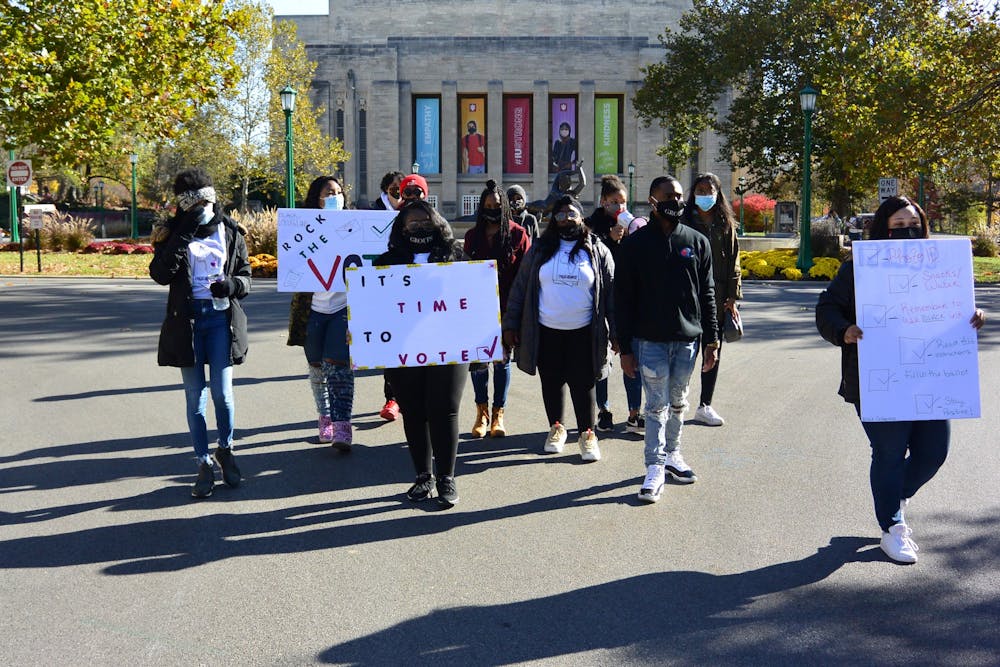This election, college students have taken charge of their right to vote. With the encouragement of multiple student groups on campus, IU students made their way to the polls.
According to Pew Research Center, the number of Black Americans eligible to vote for president has reached a record 30 million in 2020, with more than one-third living in nine of the nation’s most competitive states – Arizona, Florida, Georgia, Iowa, Michigan, North Carolina, Ohio, Pennsylvania and Wisconsin. Black eligible voters now make up 12.5% of the U.S. electorate, up from 11.5% in 2000.
Tisch College said more than 7 million young people, ages 18-29, voted early or absentee in the 2020 elections, with more than 4 million in 14 key states. Many colleges and universities have been making sure they encouraged students to vote as much as possible.
Black Collegians, an IU organization, hosted a march to the polls on Election Day. Black Collegians is a newly founded group whose mission is to engage Black voices in political affairs on and off campus. On Election Day, the group set out to encourage students to vote while instructing them on voting specifics if they were not familiar with candidates on the ballot.
“We felt it was important to facilitate a space for majority first-time Black voters to feel secure in their first voting experience,” Damorion Page, social media marketing co-chair, said. “Many people come from homes where their families didn’t vote and exercise their rights. We are here to help break that cycle.”
Tiera Howleit, president of Black Collegians, said this movement was important because our ancestors lost their lives for the right to vote. She believes it is important for us to continue their fight and their tremendous efforts. Exercising your right to vote allows you to make a difference that can affect your life and the lives of others forever. It is important to be the change you want to see.
“We need to get back to our sense of community and understanding that we are truly stronger together and that there is power in numbers,” Howleit said. “With this understanding we can truly accomplish anything.”
Black Collegians encouraged students to vote by creating a campaign on social media to get students familiar with the individuals on the ballot.
This campaign was held for a couple of weeks to keep the topic fresh in everyone’s minds. In addition to this, the group collaborated with National Association of Black Journalists at IU. The two groups had an event where they discussed political involvement and engagement to guide students on making an informed vote.
“This march was created to help spark more interest in students to exercise their right to vote,” Howleit said. “Our goal was to create a space for students, faculty and staff to join together with one another in order to garner support and encouragement for our fellow Hoosiers.”
Jalil Sanders, a, IU freshman and Groups scholar, was one of those marching to the polls. This was Sanders' first time voting in a major election, and he understood the importance of his vote. Family back home encouraged him to use his voice to vote, Sanders said.
“We have been struggling way too long,” Sanders said. “I think that if we do make a change and change our voice, this stuff will turn around. I don’t know how long as a Black man I can keep fighting for my life.”
Malissa Sanon, assistant director of diversity equity and inclusion at the O’Neil School of Public and Envionmental Affairs, and Gloria Howell, director of the Neal-Marshall Black Culture Center, were among the IU faculty members who came out to support the march. They said they were happy to see students getting out to vote and make a change. They offered words of encouragement and some resources in case students were feeling overwhelmed during this election season.
“This is very very important,” Sanon said. “This group has created an atmosphere where people are wanting to vote, which is really good.”
When it was time to start marching to the polls, the group came up with a chant and yelled it as loud as possible through their masks. “V-O-T-E we got to vote. V-O-T-E it’s time to vote.” They carried their signs proudly and marched into the Indiana Memorial Union with their heads high.
It has been two days since Election Day, and the country is still waiting for final results. Georgia, Nevada, North Carolina, Arizona and Pennsylvania are still counting absentee ballots, leaving the race too close to call.
According to the New York Times, protests over counting votes have swept through the U.S. cities such as Minneapolis, New York, Portland, Los Angeles and Chicago have seen demonstrations supporting the count of every vote. Other cities, such as Detroit, have seen protests against the counting of ballots. Even celebrities have been making tweets in support of counting every vote, such as Rihanna.
“Count every vote we’ll wait,” Rihanna said.






